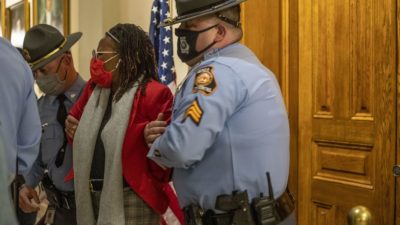The images are jarring. Behind closed doors, Georgia Governor Brian Kemp signed a bill that will severely limit voting rights in the state, while six other white men, all Republicans, look on.
Outside, a protest begins, and Georgia State Representative Park Cannon, who happens to be both a Democrat and Black, knocked on the door of the governor’s office, asking for the signing to be out in the open, as a transparent act. Representative Cannon was arrested by two (white) Georgia State Patrol officers and charged with felony obstruction of law enforcement, punishable by one to five years in prison, and with disrupting a session of the General Assembly.
There is more than irony attached to these charges, as thousands of violent – white — insurrectionists who stormed the U.S. Capitol, have yet to be arrested for their roles in disrupting the certification of a presidential election and the work of the United States Congress.

Georgia State Rep. Park Cannon was arrested for knocking on the door of Governor Brian Kemp’s office as he privately signed a bill severely limiting voting rights in Georgia on Thursday. Photo courtesy of the Atlanta Constitution.
A new Brennan Center Report shows that no less than 28 GOP-controlled state legislatures have filed at least 106 bills in blatant attempts to take away voting rights, apparently under the theory that if they can do that, they can continue to control the votes that control elected offices.
The sweeping Republican-sponsored overhaul of state elections includes new restrictions on voting by mail and greater legislative control over how elections are run. It comes after Georgia voters delivered two newly-minted U.S. Senators to the United States Senate; both Democrats in what was once a reliably red state.
Kemp himself came under criticism from then-President Donald Trump for refusing to tinker with the election results to “find the votes” necessary to give Trump the state, as he made false claims of voter fraud.
The Associated Press reported that the moves in Georgia represent what could happen in other states as well: the new law will disproportionately disenfranchise voters of color.
During his first press conference on Thursday, President Joe Biden called such GOP efforts “un-American” and “sick”. Late Thursday, a group of voter mobilization groups filed a lawsuit in federal court in Atlanta challenging the new law.
The Republican changes to voting law in Georgia follow record-breaking state turnout that led to Democratic victories in the presidential contest and two U.S. Senate runoffs in the once reliably red state.
“After the November election last year, I knew, like so many of you, that significant reforms to our state elections were needed,” said Kemp.
Well, yes. The voter turnout was historic. Georgia lawmakers, like so many in Republican-controlled statehouses, are signaling that they believe the only way to win is to figuratively “cook the books” — by limiting who gets to vote and how voting will be done.
The bill would shorten the times and number of days that voters could vote, require an ID to get an absentee ballot, and limit voting by mail. It would make it a criminal offense to give a person waiting in line to vote (in what will obviously become lengthy voting lines in a warm, southern state) so much as a bottle of water. Those southern Black church “Souls to the Polls” events appear in doubt as well.
Worse, the bill undercuts the foundations of America’s locally-managed, county-run elections. It empowers the Georgia legislature to intercede in county elections and remove county election boards if it doesn’t like the way an election is being run or the results of the election. This is a direct attack on the processes of free and fair elections as well as the democratic ideal that every citizen age 18 or over has a right to participate in our elections.
With dozens more GOP bills to limit voting being introduced in states all over the country, Georgia might be just the beginning. The U.S. House recently passed HR1, For the People Act of 2021, a sweeping effort to protect voting rights at the national level. It and HB4 — the John Lewis Voting Rights Act passed late last year, would place federal protections on America’s election processes.
But under current U.S. Senate rules, it would take 60 votes, including 10 Republican votes for it to pass. There is great doubt that 10 courageous Republican Senators exist and uncertainty of whether or not the Democrats could hold their 50-member caucus together. What is at stake would appear to be no less that the integrity of America’s democratic elections.








All I can say is O M G . . . this can’t be real. With Texas’ “one ballot box for Harris County (Houston — 4th largest city in U.S.) to this, wow — our democracy IS under attack and it isn’t antifa, BLM, the liberal left; no — it’s GOP lawmakers who are not transparent (and don’t pretend to be), bullies, and not truthful. Innocently, I ask: what’s wrong with just letting everyone vote that’s entitled to? GOP lawmakers gerrymandering out difficult and unattainable — for many — qualifiers is no different than just looking at a person’s skin color and not allowing them to vote. Except, unfortunately for the GOP lawmakers, that IS illegal because of the 15th Amendment. So, they’ll just carve out (in the Southern states) all the ways they can keep those same people from voting. More destruction to the good things in our country by the southern lawmakers.